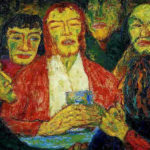We run our website the way we wished the whole internet worked: we provide high quality original content with no ads. We are funded solely by your direct support. Please consider supporting this project.

Why Did Jesus Curse a Barren Fig Tree?
While no one argues that the NT advocates violence explicitly, many allege that some passages reflect violent attitudes toward outsiders, and especially toward non-believing Jews, while others detect an element of violence in some of Jesus’ teachings and behavior. Some scholars argue that this violent aspect of the NT laid the groundwork for later Christian violence when the church began to embrace the power of the state in the fourth century. I am dealing with a few episodes from the life of Jesus that have often been used to argue for violent acts. Today I want to look at the cursing of the barren fig tree.
Both Matthew and Mark recount an episode in which Jesus cursed a fig tree because it bore no fruit and Jesus was hungry (Mt 21: 18-22, Mk 11:12-3, 21-5). What makes Jesus’ only destructive miracle even more puzzling is that Mark informs us that, “it was not the season for figs” (v. 13). According to some, this story represents Jesus engaging in a violent attack on the tree that make him appear cruel. One writer goes so far as to speculate that Jesus must have violently cursed this tree “in a petty fit of low blood sugar or something like that.”[1] I submit that if we read these accounts in context and with any degree of charity, it becomes clear that Jesus did not curse this tree in a fit of childish, cruel, or petty anger.
Fig trees are frequently used to symbolize either spiritual fruitfulness or unfruitfulness in the OT (Isa 28:4; Jer 8:13; 24:1-10; 29:17; Hos 2:12; 9:10,16-7; Mic 7:1). In this light, Jesus’ cursing of the barren fig tree should be understood as a symbolic judgment on the nation of Israel. This is made all the more clear from the fact that Mark interjects Jesus’ cleansing of the Temple (See post), which was itself a symbolic judgment on the corrupt leaders of Israel, between Jesus’ curse of the fig tree and the time when the disciple’s notice that the tree had withered. Moreover, in both Gospels the cursing is followed by a confrontation between Jesus and Jewish authorities that concludes with Jesus telling two parables that indict these leaders (Mt 21:13-46; Mk 11:27-33; 12:-1-12). By cursing the tree, Jesus is acting out a parable as God’s spokesperson against Israel.
On top of this, I submit that there is another dimension to the symbolic destructive action of Jesus in this episode. The NT reflects the widespread Jewish apocalyptic expectation that the coming of the Messiah at the end of the age would remove the curse on creation and restore it to what God originally intended it to be (e.g. Acts 3:21; Rom 8:19-22; Col 1:18-20; 2 Pet 3:13). Moreover, in apocalyptic thought, barren or infected fruit trees were sometimes understood to reflect the corrupting influence of fallen angelic powers, and barren fig trees in particular had in some writings become symbols of this curse. In this light it is easy to interpret Jesus’ cursing of the barren fig tree as not only a symbolic pronouncement of judgment on Israel, but also as a symbolic judgment on Satan’s curse on the earth. And in cursing the curse, as it were, Jesus was once again presenting himself as the Messiah who had come to vanquish Satan (Heb 2:14; 1 Jn 3:8) and to restore God’s good creation.
[1] J. H. Ellens, ed., The Destructive Power of Religion: Violence in Judaism, Christianity, and Islam, Volume 3 (Westport, CT: Praeger, 2004), 16.
Photo credit: Jackal1 via Visual Hunt / CC BY-ND
Category: General
Tags: Jesus, Non-Violence
Topics: Enemy-Loving Non-Violence
Related Reading

Cross-like Love and Non-Violence
Cosmo Spacely via Compfight Though it seems to have been forgotten by many today, the cross wasn’t simply something God did for us. According to the NT, it was also an example God calls us to follow. Hence, after John defined love by pointing us to Jesus’ death on the cross on our behalf, he…

What do you think of the “Penal Substitution” view of the atonement?
If asked what Jesus came to do and how he did it, most contemporary western Christians would automatically say something like, “Jesus took the punishment from God that I deserved.” This is what’s usually called “Penal Substitution” view of the atonement, for it emphasizes that Jesus was punished by God in our place. His sacrifice…

Which of the Miracles of Jesus Can Humans Do? (podcast)
Greg is asked about the miracles of Jesus, specifically which miracles do we have the potential to perform. He also gives a nod to the band Theocracy. Episode 74 http://traffic.libsyn.com/askgregboyd/Episode_0074.mp3

What Does it Mean to be “Holy”?
Image by much0 via Flickr People today frequently associate the word “holy” with a list “do’s” and “don’ts” that “godly” people are supposed to adhere to. The concept of “holiness” in the Bible, however, is not primary about behavior. It rather refers to something that is unique and set apart from more common things. God is…

Jesus and His Father
Greg addresses a question from a reader about the nature of the Godhead. If Jesus is the exact representation of the Father, what does this mean about the Trinity, if there are indeed three distinct persons?

The Myth of Redemptive Violence
Check out Shane Claiborne’s excellent piece on the problem of violence posted yesterday on Huffington Post. Money quote: “Christian theologians have said Jesus teaches a ‘third way’ to interact with evil. We see a Jesus who abhors both passivity and violence and teaches us a new way forward that is neither submission nor assault, neither…
